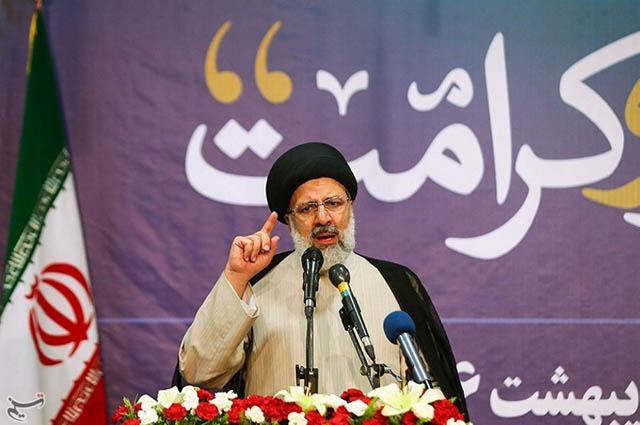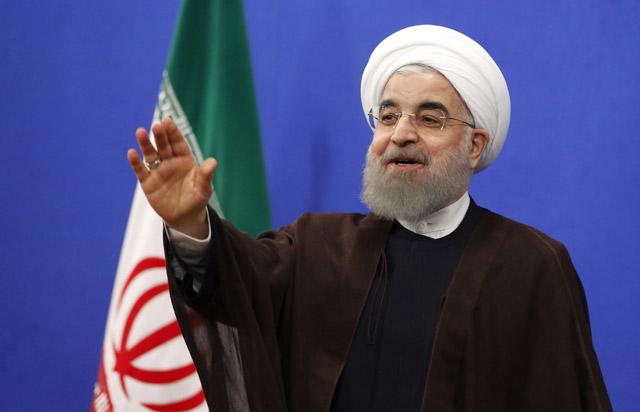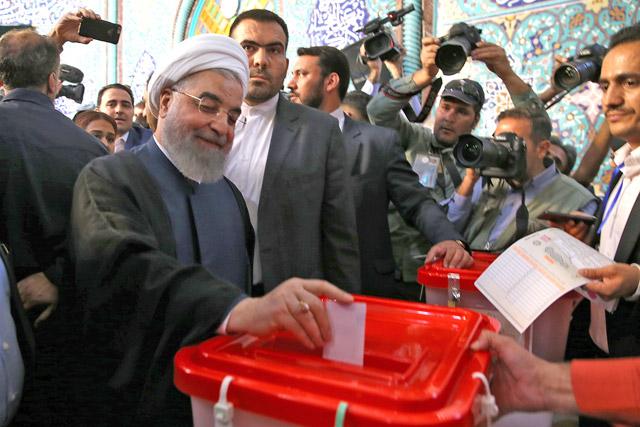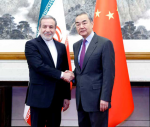You are here
Iran Guards look beyond election to next supreme leader
By Reuters - May 09,2017 - Last updated at May 09,2017

Ebrahim Raisi gestures in this undated handout photo provided by Tasnim News Agency on Tuesday (Reuters photo)
BEIRUT — Determined to protect a dominant security role and vast economic interests, Iran's Revolutionary Guards military force is quietly backing a hardliner in May 19 presidential polls, with an eye towards a bigger prize: the succession of the supreme leader.
President Hassan Rouhani, a relative moderate elected in 2013 in a landslide on promises to open up Iranian society and reduce its international isolation, is widely seen as the favourite to win a second term next week.
But the Islamic Revolutionary Guards Corps (IRGC), and the Basij, a volunteer militia under the Guards' command, are taking steps to promote the candidacy of his main rival, hardline cleric Ebrahim Raisi.
Media outlets affiliated with the Guards have been criticising Rouhani's performance in power. Experts who study the force say they are also likely to use their street muscle to help get Raisi supporters to the polls.
"The IRGC will be running buses and mini-buses to make people vote. They will be mobilising voters not only in the rural areas, but also the shantytowns around the big cities," said Ali Alfoneh, a senior fellow at the Atlantic Council who has done extensive research on the Guards.
"They want their supporters voting."
The Islamic Republic's security hawks are worried that Rouhani with a fresh mandate would chip away at prerogatives that have given the Guards huge economic and political power.
Whether or not Rouhani wins a second term, the bigger prize is controlling who will succeed Supreme Leader Ayatollah Ali Khamenei, whose power far exceeds that of the elected president.
Khamenei, in power since 1989, is now 77. Some analysts say Raisi's presidential bid is a test run for a man who could be groomed to take over as Khamenei's successor.
"This election is not only about choosing the president. It's about succession after Khamenei," said Alfoneh. "The IRGC believe that it's their chance to completely eliminate the technocrats and control the succession process after Khamenei."
Arrests
Khamenei's successor will be chosen by a body called the Assembly of Experts, elected last year for an eight year term.
Rouhani himself sits in the assembly as one of its biggest vote-getters, and he and his allies nearly swept the seats from the capital Tehran.
But many members of the body are not firmly associated with either the reformist or traditionalist camp, and the faction that wins the presidential election could gain an advantage in trying to solidify backing for its candidate for supreme leader.
The Guards have been making their preferences known. In mid-March, the IRGC arrested a dozen administrators of reformist social media channels on the platform Telegram, which is hugely popular in Iran and used by millions of people.
The arrests prompted parliamentarian Mahmoud Sadeghi to write a letter to the head of the Guards asking the group not to interfere in the upcoming presidential election.
Sadeghi wrote that media outlets affiliated with the Guards were also "working against reformists and the supporters of the government", according to the Iranian Labour News Agency which printed a copy of the letter.
Raisi was a member of a committee which oversaw the execution of thousands of dissidents in 1988, according to the Centre for Human Rights in Iran, a New York-based research and advocacy organisation. During his time at the judiciary, Raisi established ties with senior members of the Revolutionary Guards.
"Raisi is the Revolutionary Guards candidate," said Mohsen Sazegara, a founding member of the Revolutionary Guards who is now a US-based dissident. "He worked closely with the Revolutionary Guards when he was at the judiciary."
Attempts to reach a Revolutionary Guards media office were unsuccessful.
Although Khamenei is guarded about his political preferences, Raisi also appears to have the supreme leader's backing as a presidential candidate and possible successor.
Beginning in the early 1990s, Raisi attended religious classes taught by Khamenei for a period of 14 years, according to an official biography posted online. Last year, Khamenei appointed Raisi as head of a multi-billion dollar religious foundation, Astan Qods Razavi.
A delegation of senior Revolutionary Guards commanders went to visit Raisi in the city of Mashad when he was appointed head of the foundation last year, according to Fars News.
Among the group were the head of the Guards, the head of the Basij, and Qassem Soleimani, the head of the Quds Force, the branch of the Guards responsible for operations outside of Iran's borders, including in Iraq and Syria.
Maintaining domestic security is one of the key reasons why the Guards want to have a candidate of their choosing for the presidency and the supreme leader.
The disputed 2009 presidential elections, which put Mahmoud Ahmadinejad into office for a second term, led to the most widespread unrest in the history of the Islamic Republic. Millions of protestors took to the streets in Tehran and several other large cities.
The Guards oversaw the crackdown on protesters primarily through the Basij. Dozens of demonstrators were killed and hundreds were arrested, according to human rights organisations.
But there is another reason why the Guards want an ally in Iran's top positions: the group has vast economic holdings, from construction to oil and mines, worth billions of dollars.
While in office, Rouhani has clashed repeatedly with the Guards about their contracts and business interests.
"The entry of armed forces to economic temptations can distance them from their original duty and goal," Rouhani said in a speech last month, according to the official website of the presidency.
The Guards, for their part, have criticised the deal with Western powers negotiated by the Rouhani government, under which most international financial sanctions were lifted in exchange for curbs on Iran's nuclear programme. Rouhani has touted the agreement as his top achievement.
Related Articles
DUBAI — Iranians yearning for detente abroad and greater freedoms at home have handed President Hassan Rouhani a second term, but the hardli
DUBAI/BEIRUT — President Hassan Rouhani pledged on Saturday to open Iran to the world and deliver freedoms its people have yearned for, thro
DUBAI — Millions of Iranians queued up to vote on Friday, showing strong turnout in an unexpectedly tight election pitting President Hassan

















